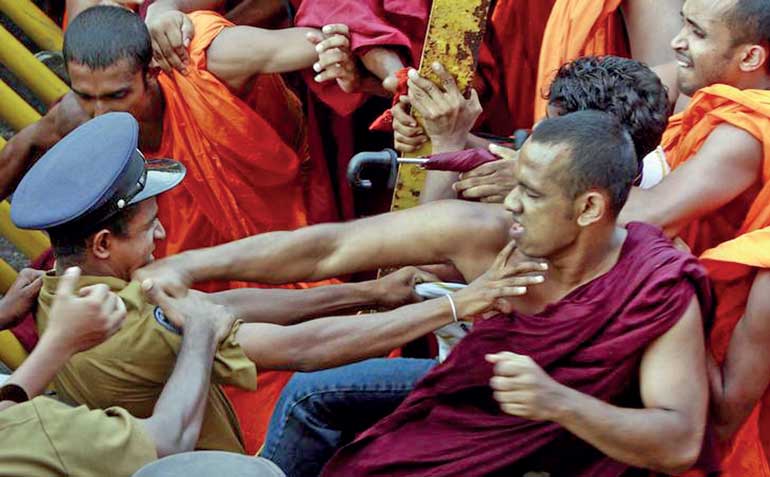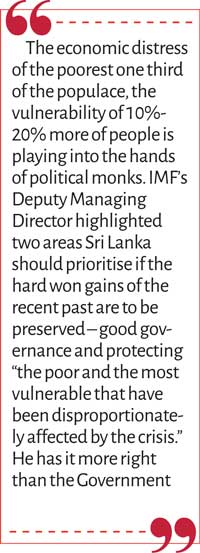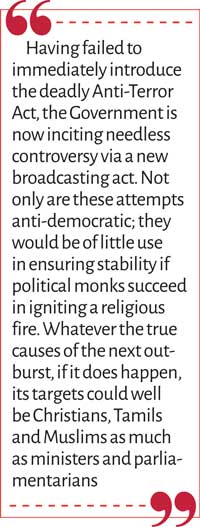Monday Feb 16, 2026
Monday Feb 16, 2026
Wednesday, 7 June 2023 00:30 - - {{hitsCtrl.values.hits}}

A country running to the beat of fear and intolerance might be the promised land of the political monk’s dreams. But is that where we want to end?
“He who controls his hand, controls his foot, controls his speech and is well-controlled in all respects, delights in meditation, is composed, solitary, and content – him they call a bhikku.”The Buddha (Bhikku Vagga, Dhammapada)
By Tisaranee Gunasekara
In 2005, the Newsweek magazine reported that officials at Guantanamo flushed a Koran down a toilet to hurt the feelings of Muslim detainees. In several Muslim-majority lands, protests erupted. 15 people lost their lives.
An Australian journalist called religious leaders of that country, including Ajahn Brahmawanso, asking a test question. What would you do if your holy book was flushed down the toilet? Answered Ajahn Brahm, “If someone took a Buddhist holy book and flushed it down my toilet, the first thing I would do is call a plumber.”
Once the journalist stopped laughing, the monk explained his answer. “The book is not the religion. Nor is the statue, the building, or the priest. These are only ‘containers’. What does the book teach us? What does the statue represent? What qualities are the priests supposed to embody? These are the ‘contents’. We can print more books, build more temples...but when we lose our love and respect for others and ourselves and replace it with violence, then the whole religion has gone down the toilet.” (https://wisdomexperience.org/ebook/dont-worry-be-grumpy/1-the-container-and-the-contents/)
If even the rumour (true or false) of a Buddhist text being so treated reaches the waiting ears of Lankan political monks, would their response be any less violent, any less irrational than the reaction in Afghanistan or Pakistan over the Koran issue? Probably not, going by their incendiary reaction to Natasha Edirisooriya’s joke. Trying to unleash another round of religious bloodletting over a few inapt words is not just un-Buddhist; it is the very antithesis of what the Buddha taught.
Having exhausted the potential of the Tamil and the Muslim enemy (for now), political monks are pivoting to the Christian enemy, again. “A Christian fundamentalist program even more dangerous (than Islamic fundamentalism) is happening in this country,” preaches political monk
 Galagoda Aththe Gnanasara Gnanasara of Bodu Bala Sena. “In a land where more than 70% are Sinhala Buddhists, those who attack the Buddhist culture should be scared. Keep that fear... Born Again clique has been planning this for a long time... Because the Rajapaksas have become weak, we cannot watch while Sinhala-Buddhist ideology is being attacked.” That was political monk Balangoda Kassapa, a newcomer to the scene who turned himself from a nobody into a somebody by playing a visible role in the Aragalaya (the Government helped him inadvertently by arresting him for illegally entering the PM’s office).
Galagoda Aththe Gnanasara Gnanasara of Bodu Bala Sena. “In a land where more than 70% are Sinhala Buddhists, those who attack the Buddhist culture should be scared. Keep that fear... Born Again clique has been planning this for a long time... Because the Rajapaksas have become weak, we cannot watch while Sinhala-Buddhist ideology is being attacked.” That was political monk Balangoda Kassapa, a newcomer to the scene who turned himself from a nobody into a somebody by playing a visible role in the Aragalaya (the Government helped him inadvertently by arresting him for illegally entering the PM’s office).
Political monk Akmeemana Dayarathana, head of Sinhala Ravaya and a veteran of the religious wars, spelled out the plan and the goal. “We can see that there’s a large crowd behind her (Nathasha Edirisooriya)... We also see this as American funded; their weapon-sales are down so (they are trying) to create a war here... We have unruly boys... Do not turn them into suicidal-killers... If the law isn’t implemented there will be huge clashes. A non-Buddhist person will not be able to step on to the road.”
Pastor Jerome Fernando wouldn’t be a Christian if he didn’t think Jesus Christ is superior to the Buddha and all other religious leaders. He made that remark to his own congregation, and not to a company of Buddhists. Comedian Natasha Edirisooriya made no mention of the Buddha or Buddhism. Going by her LinkedIn page, she was trying to use humour to address the fear of public speaking among young people. It was in that context she mentioned Prince Siddhartha and King Suddhodana. Neither the pastor nor the comedian was trying to incite Buddhists. That crime was being committed by the political monks. The ICCPR is intended for the likes of them. Yet they are free to spew their incendiary nonsense while Nathasha Edirisooriya and SL Vlog owner Bruno Divakara are in jail.
Sri Samantha Badda thero called the Tooth Relic a porcine tooth. Political monks didn’t rush to the CID. Businessman Dilith Jayaweera asked whether Siddhartha was a loser. Political monks didn’t rush to the CID. Political monks are perverting the ICCPR the same way they perverted Buddhism. If anyone is insulting Buddhism, it is these robe-wearers through their conduct totally unfitting to any disciple of the Buddha. Yet governments (past, present, and future) and society give them a free rein, fearing a backlash.
In which new hell will this road end?
A Buddhist inquisition?
“If you meet the Buddha on the road, kill him,” says a famous Zen Koan attributed to ninth century Chinese Buddhist monk Linji Yixuan (this refers to objectification and the belief that we know it all). Had Linji Yixuan been a Christian in Medieval Europe and said this about the Christ, the Inquisition would have zeroed in on him and a gruesome death would have been his fate. That seemingly provocative koan led to no howls of blasphemy because the notion of blasphemy had no place in Buddhism until a couple of centuries ago (thereby obviating the need for inquisitorial laws or institutions). When the Occident was mired in violent religious intolerance, the Orient offered a wide tent.
Joseph Campbell points out that “When newly Christianised Roman Empire persecuted the old religions, the refugees went to Persia and to India,” (Oriental Mythology). Prof. Wendy Dorniger makes the distinction between orthodoxy (believing the right thing) and orthopraxy (doing the right thing) and contends that “Hinduism in its early period was far more orthoprax than orthodox,” (Prelude to Censorship – The Toleration of Blasphemy in Ancient India). The same was true of Buddhism when – and as long as – Buddhism remained what the Buddha taught.
Brahmajala sutta provides one of many examples of why blasphemy – and punishments deriving from it – has no place in Buddhism. Once the Buddha and his disciples were walking along the highway between Rajagaha and Nalanda. A wanderer called Suppiya and his disciple too were travelling the same way. Through the journey Suppiya spoke in “dispraise of the Buddha, the Dhamma, and the Sangha,” while his pupil praised them. The same thing happened when they were resting in the night.
 The next morning, hearing the story from the monks, the Buddha said, “If, bhikkhus, others speak in dispraise of me, or in dispraise of the Dhamma, or in dispraise of the Sangha, you should not give way to resentment, displeasure, or animosity against them in your heart. For if you were to become angry or upset in such a situation, you would only be creating an obstacle for yourselves. If you were to become angry or upset when others speak in dispraise of us, would you be able to recognise whether their statements are rightly or wrongly spoken?... If, bhikkhus, others speak in dispraise of me, or in dispraise of the Dhamma, or in dispraise of the Sangha, you should unravel what is false and point it out as false, saying: ‘For such and such a reason this is false, this is untrue, there is no such thing in us, this is not found among us,” (https://www.accesstoinsight.org/tipitaka/dn/dn.01.0.bodh.html).
The next morning, hearing the story from the monks, the Buddha said, “If, bhikkhus, others speak in dispraise of me, or in dispraise of the Dhamma, or in dispraise of the Sangha, you should not give way to resentment, displeasure, or animosity against them in your heart. For if you were to become angry or upset in such a situation, you would only be creating an obstacle for yourselves. If you were to become angry or upset when others speak in dispraise of us, would you be able to recognise whether their statements are rightly or wrongly spoken?... If, bhikkhus, others speak in dispraise of me, or in dispraise of the Dhamma, or in dispraise of the Sangha, you should unravel what is false and point it out as false, saying: ‘For such and such a reason this is false, this is untrue, there is no such thing in us, this is not found among us,” (https://www.accesstoinsight.org/tipitaka/dn/dn.01.0.bodh.html).
In Sri Lanka, the land where the Buddha’s teaching in their most pristine form is supposed to exist, this wise content is being flushed down the toilet to protect the container. Because here, contents matter little; container is all. How else can there be something called Sinhala Buddhism? How else can there be nikayas based on caste?
When John Lennon told the Evening Standard in 1966, “We’re more popular than Jesus now; I don’t know which will go first – rock ‘n’ roll or Christianity,” the American Bible Belt erupted. The blowback included radio bans, picketing, and record-burning. (Fearing for the lives of his friends, Lennon reluctantly apologised. Lennon’s killer would mention the comment as one reason for the murder). While the controversy was raging, George Harrison told the Evening Standard, “If Christianity’s as good as they say it is, it should stand up to a bit of discussion.” When Lankan writer and journalist Manjula Wediwardana was arrested in 2000 following a complaint made by a Catholic priest (that his soon-to-be-released book insulted Virgin Mary), Prof. Sucharitha Gamlath asked, “How can a lowly human like Wediwardana insult the Mother of God?” Mustofa Bisri, Indonesian Muslim leader, scholar, painter and poet put it best in his poem Allahu Akbar. “If all the six billion human inhabitants of the earth...were blasphemous...it would not have the slightest effect on his greatness.”
Can a Jerome Fernando or a Nathasha Edirisooriya insult the Buddha? Does the Buddha need a Galagoda Atthe Gnanasara to protect his reputation or his teaching? Aren’t the political monks being not just ignorant and violent, but also a tad presumptuous?
“An inquisition impulse can quietly take root in the very system of Government and civil society that order our lives,” Cullen Murphy warns in God’s Jury. Last week, the Outrage Brigade demanded that all those who laughed at Nathasha Edirisooriya’s joke should be arrested. On 30 May, the wife of another comedian complained to the CID about threats to her family of three young daughters because her husband had been in the audience. One SLPP Parliamentarian opined that the comedian and others like her should be publicly executed. Political monks are clamouring for a religious police and new laws. An inquisitorial mood seems to be permeating society. Pakistan provides an excellent example of what such mentalities beget. Remember how Priyantha Kumara was lynched by a pious mob for an alleged insult to the Prophet?
Their promised land
In December 2022, Walavahangunawave Dhammarathana thero, the chief incumbent of Mihintale threatened to lead the people in a new Aragalaya to eject the Government and the parliament. Last week, addressing the faithful during Poson, he made a similar call. “In future it may not be possible to have ceremonies like this with kings such as this,” he said tearfully, referring to the controversy about funding for Poson festival. “Therefore all the people of the land, unite. We will give leadership. (We) won’t contest. We must direct good people... Arhat Mihindu did system change from here. The time has come for a system change. We will not take weapons or do Hartal. People, line up. Venerable monks, line up.”
 During the anti-13th Amendment protests in February, Agalakada Sirisumana thero, a professor in the Sinhala Department of the Colombo University, made a similar statement. Accusing Ranil Wickremesinghe of trying to create ‘a racial conflict’ by promoting devolution, he said, “Leaders cannot be allowed to do such things the way they want. If they do, only the monks can throw you out on your ear.”
During the anti-13th Amendment protests in February, Agalakada Sirisumana thero, a professor in the Sinhala Department of the Colombo University, made a similar statement. Accusing Ranil Wickremesinghe of trying to create ‘a racial conflict’ by promoting devolution, he said, “Leaders cannot be allowed to do such things the way they want. If they do, only the monks can throw you out on your ear.”
At a facile level, there’s much difference between a Sirsumana thero and a Kassapa thero. What they have in common is the belief that they have the right to lead this land.
W.A. Abeysinhe in his The Kingdom of Gautama Buddha and other debatable essays warns that “Political monk is an invasive vine on the tree of Sasana. Once the vine grows the tree would die. That is happening now.” Political monk, because his objectives and interventions are primarily political, is an invasive vine on the body politic as well. He is a danger to democracy and to those basic rights without which we will be not free citizens but unfree subjects. What they want is what the Ayatollahs have in Iran, the Catholic Church strove to have for centuries, and what Calvin created in Geneva for a while: absolute, untrammelled power over state and society, individual and family. They want to decide who should be the president and what books we should read, what laws should decree and how many children a woman should have (depending on ethnicity and religion), how the economy should be run and what jokes we should laugh at. That would not be Sri Lanka as we know it; in fact that wouldn’t even be Lanka as it ever was.
The economic distress of the poorest one third of the populace, the vulnerability of ten to twenty percent more of people is playing into the hands of political monks. IMF’s Deputy Managing Director highlighted two areas Sri Lanka should prioritise if the hard won gains of the recent past are to be preserved – good governance and protecting “the poor and the most vulnerable that have been disproportionately affected by the crisis.” He has it more right than the Government.
Having failed to immediately introduce the deadly Anti-Terror Act, the Government is now inciting needless controversy via a new broadcasting act. Not only are these attempts anti-democratic; they would be of little use in ensuring stability if political monks succeed in igniting a religious fire. Whatever the true causes of the next outburst, if it does happen, its targets could well be Christians, Tamils and Muslims as much as ministers and parliamentarians.
Political monks, like their one-time masters the Rajapaksas, cannot function without a threat, an enemy, and a conflict. That is how they gain a role and relevance as guides and saviours. But when Buddhism is so weaponised, prominence belongs to those who are unworthy of the saffron robe, according to what the Buddha taught. They become the sole public face of Buddhism, miring the sasana in their miasma. A country running to the beat of fear and intolerance might be the promised land of the political monk’s dreams. But is that where we want to end? Where else can we end if we don’t resist this madness, at least now?